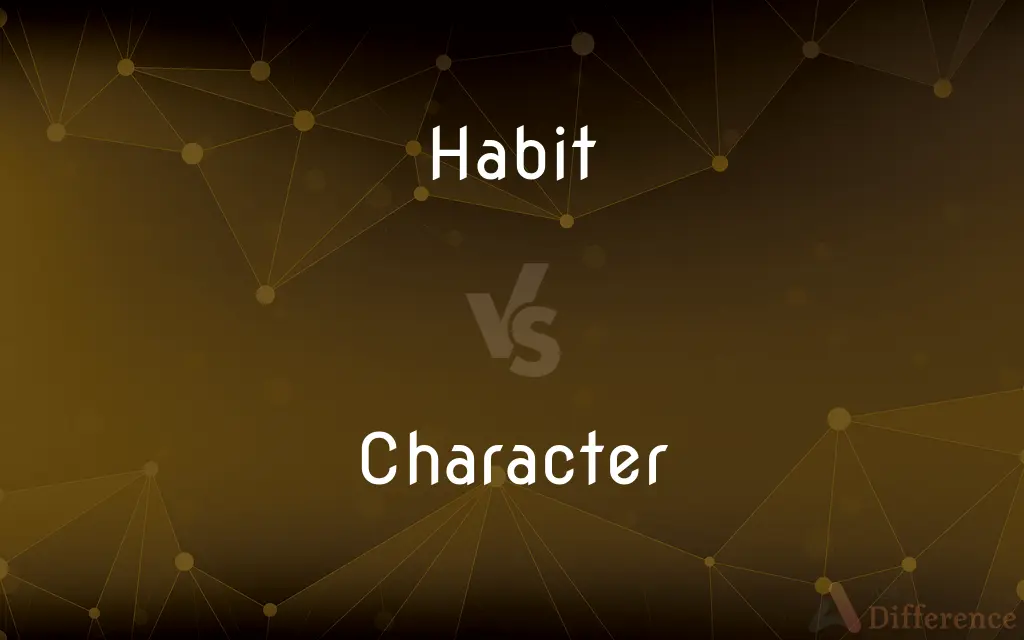Habit vs. Character — What's the Difference?
By Urooj Arif & Maham Liaqat — Updated on March 7, 2024
Habit refers to repeated behaviors or actions, while character embodies one's moral and ethical qualities, shaping overall personality.

Difference Between Habit and Character
Table of Contents
ADVERTISEMENT
Key Differences
Habit is a routine of behavior that is repeated regularly and tends to occur subconsciously. Habits, such as brushing teeth or exercising, can be developed through repetition and can be both positive and negative. Whereas character refers to the set of qualities and traits that define a person's moral and ethical values, such as honesty, integrity, and kindness. Character is not about actions that are performed out of routine but rather reflects deep-seated beliefs and values that influence behavior.
While habits can be relatively easy to change with effort and conscious intervention, character traits are deeply ingrained and evolve over a longer period of time through experiences and choices. On the other hand, character is shaped by one’s decisions, beliefs, and interactions with others, representing a more stable and enduring aspect of an individual.
Habits can be observed externally through one's actions and behaviors that are repeated in specific contexts. For instance, a habit of reading before bed every night is a learned behavior. Conversely, character is not always visible through external actions but is reflected in the choices made in challenging situations, such as standing up for what is right, even when it is difficult.
Habits contribute to the development of one's character by fostering disciplines or behaviors that align with personal values and moral standards. However, while a person can practice habits such as punctuality or kindness, these actions become part of one's character when they are motivated by intrinsic values rather than external rewards or pressures.
While habits are specific, automatic behaviors acquired through repetition, character encompasses the broader, more abstract qualities of a person's nature, including their moral and ethical standards. While habits can influence character, the two are distinct in how they manifest and impact an individual's life.
ADVERTISEMENT
Comparison Chart
Definition
A regular behavior or routine that is performed automatically.
The combination of attributes, traits, and qualities that form an individual's moral and ethical personality.
Changeability
Relatively easy to change with conscious effort.
More difficult to change, deeply ingrained in one's personality.
Visibility
Often observed through external actions.
Not always visible, reflected in choices and moral decisions.
Development
Acquired through repetition and practice.
Shaped by experiences, values, and moral decisions.
Influence
Can contribute to character development by fostering discipline.
Reflects and influences one's overall behavior and interactions with others.
Compare with Definitions
Habit
Habits can be formed through repetition.
Drinking water right after waking up became her healthy habit.
Character
Character is revealed during tough times.
He showed his true character when he helped during the crisis.
Habit
A habit is a routine of behavior.
He developed a habit of jogging every morning.
Character
Character affects how we interact with others.
Her character inspires respect and trust from her peers.
Habit
Habits can be consciously changed.
She broke her habit of checking emails late at night.
Character
Character involves ethical judgments.
Integrity is a key aspect of good character.
Habit
Negative habits can impact health.
Smoking is a harmful habit with serious health risks.
Character
Character is the essence of a person’s moral fiber.
Her honesty is a testament to her strong character.
Habit
Habits influence daily activities.
His habit of planning the day ahead improved his productivity.
Character
Character is built over a lifetime.
Life experiences have shaped his compassionate character.
Habit
A habit (or wont as a humorous and formal term) is a routine of behavior that is repeated regularly and tends to occur subconsciously.The American Journal of Psychology (1903) defined a "habit, from the standpoint of psychology, [as] a more or less fixed way of thinking, willing, or feeling acquired through previous repetition of a mental experience." Habitual behavior often goes unnoticed in persons exhibiting it, because a person does not need to engage in self-analysis when undertaking routine tasks. Habits are sometimes compulsory.
Character
The combination of mental characteristics and behavior that distinguishes a person or group.
Habit
A settled or regular tendency or practice, especially one that is hard to give up
He has an annoying habit of interrupting me
We stayed together out of habit
Good eating habits
Character
The distinguishing nature of something.
Habit
A long, loose garment worn by a member of a religious order
Nuns in long brown habits, black veils, and sandals
Character
Public estimation of someone; reputation
Personal attacks that damaged her character.
Habit
Be dressed or clothed
A boy habited as a serving lad
Character
(Biology) A structure, function, or attribute of an organism, influenced by genetic, environmental, and developmental factors.
Habit
A person's health or constitution
A victim to a consumptive habit
Character
Moral strength; integrity
An educational program designed to develop character.
Habit
A recurrent, often unconscious pattern of behavior that is acquired through frequent repetition
Made a habit of going to bed early.
Character
A person considered as having a specific quality or attribute
"Being a man of the world and a public character, [he] took everything as a matter of course" (George Eliot).
Habit
An established disposition of the mind or character
A pessimistic habit.
Character
A person considered funny or eccentric
Catcalls from some character in the back row.
Habit
Customary manner or practice
An early riser by habit.
Character
A person portrayed in an artistic piece, such as a drama or novel.
Habit
An addiction, especially to a narcotic drug.
Character
A person or animal portrayed with a personality in comics or animation
A cartoon character.
Habit
Characteristic appearance, form, or manner of growth, especially of a plant or crystal
"The habit of an apple tree is fine for the small garden" (Robert Dash).
Character
Characterization in fiction or drama
A script that is weak in plot but strong in character.
Habit
A distinctive set of clothing or style of dressing, especially of a religious order.
Character
Status or role; capacity
In his character as the father.
Habit
A riding habit.
Character
A description of a person's attributes, traits, or abilities.
Habit
(Archaic) Physical constitution.
Character
A formal written statement as to competency and dependability, given by an employer to a former employee; a recommendation.
Habit
To clothe; dress.
Character
A mark or symbol used in a writing system.
Habit
To clothe in a habit, especially a nun's habit.
Character
A Chinese character.
Habit
An action performed on a regular basis.
It’s become a habit of mine to have a cup of coffee after dinner.
Character
One of a set of symbols, such as letters or numbers, that are arranged to express information.
Habit
An action performed repeatedly and automatically, usually without awareness.
By force of habit, he dressed for work even though it was holiday.
Character
The numerical code representing such a character.
Habit
A long piece of clothing worn by monks and nuns.
It’s interesting how Catholic and Buddhist monks both wear habits.
Character
(Mathematics) The trace function of a representation.
Habit
A piece of clothing worn for a specific activity; a uniform.
The new riding habits of the team looked smashing!
Character
A style of printing or writing
"Here is the hand and seal of the Duke.
You know the character" (Shakespeare).
Habit
(archaic) Outward appearance; attire; dress.
Character
A cipher or code for secret writing.
Habit
Form of growth or general appearance and structure of a variety or species of plant or crystal.
Character
Of or relating to one's character.
Habit
An addiction.
He has a 10-cigar habit.
Kick the habit
Character
Specializing in the interpretation of often minor roles that emphasize fixed personality traits or specific physical characteristics
A character actor.
Habit
(transitive) To clothe.
Character
Of or relating to the interpretation of such roles by an actor
The character part of the hero's devoted mother.
Habit
To inhabit.
Character
Dedicated to the portrayal of a person with regard to distinguishing psychological or physical features
A character sketch.
Habit
The usual condition or state of a person or thing, either natural or acquired, regarded as something had, possessed, and firmly retained; as, a religious habit; his habit is morose; elms have a spreading habit; esp., physical temperament or constitution; as, a full habit of body.
Character
To write, print, engrave, or inscribe.
Habit
The general appearance and manner of life of a living organism.
Character
To portray or describe; characterize.
Habit
Fixed or established custom; ordinary course of conduct; practice; usage; hence, prominently, the involuntary tendency or aptitude to perform certain actions which is acquired by their frequent repetition; as, habit is second nature; also, peculiar ways of acting; characteristic forms of behavior.
A man of very shy, retired habits.
Character
(countable) A being involved in the action of a story.
Habit
Outward appearance; attire; dress; hence, a garment; esp., a closely fitting garment or dress worn by ladies; as, a riding habit.
Costly thy habit as thy purse can buy.
There are, among the statues, several of Venus, in different habits.
Character
(countable) A distinguishing feature; characteristic; trait; phene.
A single locus governing the petal colour character was detected on the linkage group A2.
Habit
The distinctive clothing worn commonly by nuns or monks; as, in the late 1900's many orders of nuns discarded their habits and began to dress as ordinary lay women.
How use doth breed a habit in a man!
He who reigns . . . upheld by old repute,Consent, or custom
Character
A complex of traits marking a person, group, breed, or type.
A study of the suspect's character and his cast iron alibi ruled him out.
Habit
To inhabit.
In thilke places as they [birds] habiten.
Character
(uncountable) Strength of mind; resolution; independence; individuality; moral strength.
He has a great deal of character.
"You may not like to eat liver," said Calvin's father, "but it builds character."
Habit
To dress; to clothe; to array.
They habited themselves like those rural deities.
Character
(countable) A unique or extraordinary individual; a person characterized by peculiar or notable traits, especially charisma.
Julius Caesar is a great historical character.
That bloke is such a character.
Habit
To accustom; to habituate.
Character
(countable) A written or printed symbol, or letter.
Habit
An established custom;
It was their habit to dine at 7 every evening
Character
Style of writing or printing; handwriting; the particular form of letters used by a person or people.
An inscription in the Runic character
Habit
A pattern of behavior acquired through frequent repetition;
She had a habit twirling the ends of her hair
Long use had hardened him to it
Character
A secret cipher; a way of writing in code.
Habit
(religion) a distinctive attire (as the costume of a religious order)
Character
One of the basic elements making up a text file or string: a code representing a printing character or a control character.
Habit
Excessive use of drugs
Character
A person or individual, especially one who is unknown.
We saw a shady character slinking out of the office with some papers.
That old guy is a real character.
Habit
Put a habit on
Character
A complex number representing an element of a finite Abelian group.
Character
(countable) Quality, position, rank, or capacity; quality or conduct with respect to a certain office or duty.
In the miserable character of a slave
In his character as a magistrate
Character
The estimate, individual or general, put upon a person or thing; reputation.
A man's character for truth and veracity
Her actions give her a bad character.
Character
A reference given to a servant, attesting to their behaviour, competence, etc.
Character
Personal appearance.
Character
(obsolete) To write (using characters); to describe.
Character
A distinctive mark; a letter, figure, or symbol.
It were much to be wished that there were throughout the world but one sort of character for each letter to express it to the eye.
Character
Style of writing or printing; handwriting; the peculiar form of letters used by a particular person or people; as, an inscription in the Runic character.
You know the character to be your brother's?
Character
The peculiar quality, or the sum of qualities, by which a person or a thing is distinguished from others; the stamp impressed by nature, education, or habit; that which a person or thing really is; nature; disposition.
The character or that dominion.
Know well each Ancient's proper character;His fable, subject, scope in every page;Religion, Country, genius of his Age.
A man of . . . thoroughly subservient character.
Character
Strength of mind; resolution; independence; individuality; as, he has a great deal of character.
Character
Moral quality; the principles and motives that control the life; as, a man of character; his character saves him from suspicion.
Character
Quality, position, rank, or capacity; quality or conduct with respect to a certain office or duty; as, in the miserable character of a slave; in his character as a magistrate; her character as a daughter.
Character
The estimate, individual or general, put upon a person or thing; reputation; as, a man's character for truth and veracity; to give one a bad character.
This subterraneous passage is much mended since Seneca gave so bad a character of it.
Character
A written statement as to behavior, competency, etc., given to a servant.
Character
A unique or extraordinary individuality; a person characterized by peculiar or notable traits; a person who illustrates certain phases of character; as, Randolph was a character; Cæsar is a great historical character.
Character
One of the persons of a drama or novel.
Character
To engrave; to inscribe.
These trees shall be my books.And in their barks my thoughts I 'll character.
Character
To distinguish by particular marks or traits; to describe; to characterize.
Character
An imaginary person represented in a work of fiction (play or film or story);
She is the main character in the novel
Character
A characteristic property that defines the apparent individual nature of something;
Each town has a quality all its own
The radical character of our demands
Character
The inherent complex of attributes that determine a persons moral and ethical actions and reactions;
Education has for its object the formation of character
Character
An actor's portrayal of someone in a play;
She played the part of Desdemona
Character
A person of a specified kind (usually with many eccentricities);
A real character
A strange character
A friendly eccentric
The capable type
A mental case
Character
Good repute;
He is a man of character
Character
A formal recommendation by a former employer to a potential future employer describing the person's qualifications and dependability;
Requests for character references are all to often answered evasively
Character
A written symbol that is used to represent speech;
The Greek alphabet has 24 characters
Character
Engrave or inscribe characters on
Common Curiosities
Can a bad habit define a person's character?
A bad habit does not define a person's character, as character encompasses broader moral and ethical qualities.
How can one improve their character?
Improving character involves self-reflection, learning from experiences, and making ethical choices.
How do habits influence health?
Habits directly impact health through actions that either contribute to or detract from physical and mental well-being.
What is more important, habit or character?
Both are important, but character is fundamental as it reflects one's core values and ethics.
Can habits affect one's character?
Yes, habits can influence character by reinforcing behaviors that align with personal values and ethics.
Is it easier to change a habit or character trait?
It is generally easier to change a habit than a character trait, as habits are specific behaviors, while character traits are deeply ingrained.
How long does it take to form a new habit?
It can take anywhere from 18 to 254 days to form a new habit, depending on the behavior and the person.
Are character traits innate?
Character traits are influenced by both innate tendencies and life experiences.
Are all habits bad?
No, habits can be both positive and negative, and positive habits are beneficial for personal development and health.
Can character change over time?
Yes, character can evolve over time through experiences, reflections, and conscious choices.
What is the difference between character and personality?
Character refers to moral and ethical qualities, while personality encompasses the broader range of emotional, social, and mental traits.
Can someone have good habits but poor character?
Yes, it's possible to practice good habits without them necessarily reflecting one's character, especially if the habits are not motivated by genuine moral values.
What is the role of discipline in character building?
Discipline plays a key role in character building by fostering the consistent practice of ethical behaviors and decisions.
How can parents help develop good character in their children?
Parents can model ethical behavior, teach values, and provide guidance and support to help develop good character in their children.
How does society influence character development?
Society influences character development through cultural values, social norms, and interactions that shape moral and ethical views.
Share Your Discovery

Previous Comparison
Government vs. Business
Next Comparison
Wonder vs. ThinkAuthor Spotlight
Written by
Urooj ArifUrooj is a skilled content writer at Ask Difference, known for her exceptional ability to simplify complex topics into engaging and informative content. With a passion for research and a flair for clear, concise writing, she consistently delivers articles that resonate with our diverse audience.
Co-written by
Maham Liaqat















































